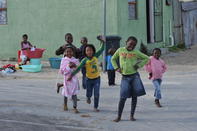The argument that shifts the blame onto external factors in the built environment that make us fat should not mean Mr and Mrs Individual get to abdicate their responsibility entirely. Yes, we are all swimming against a rip current, but we can still keep paddling forward.

One of the suggestions from the National Food Consumption Survey in 2005 was to get them while they are young, mostly by targeting the schooling system, because the state healthcare system is stretched way too thin to be able to fix the problem at the adult level through the kind of community-based programmes that would incorporate ‘dietary interventions together with an increase in physical activity levels, from the sedentary to the more active level’.
Designing fixes for school and preschool children might be a better way to spend the budget in the long term, says the National Food Consumption Survey. For starters, encouraging exclusive breastfeeding will reduce an infant’s chances of becoming obese later in life (the South African Department of Health has already adjusted its policy accordingly).
Children should get back onto the playing fields and moving their bodies (late in 2011, the state announced that it planned to introduce compulsory sports in South African schools once more). And there should be some kind of restriction on the kinds of foods that school tuck shops can sell – certainly there needs to be some effort to cut the amount of high-energy snacks and sugary drinks that children can buy during lunch breaks and after school.
Some have even suggested a ban on fast food outlets from within a certain radius of any hubs of child activity such as schools or playgrounds. It is a lot harder for children to say no than for adults, and once they learn those bad patterns at such a young age, changing these behaviours later in life can be extremely difficult.
By Leonie Joubert